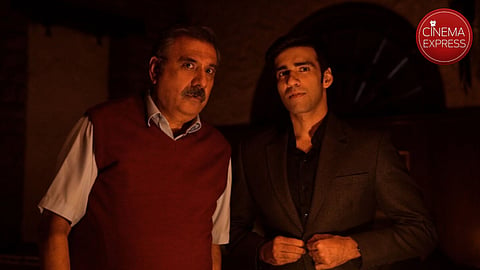

There is a certain novel-like charm of lingering silences in Boman Irani’s directorial debut The Mehta Boys. A father and son sharing a drink during a power cut in the congested balcony of a Mumbai flat becomes as magical as it is real. Lit candles in the scene feel more like an illumination of ball-sized stars in the night sky. An argument between the two at the terrace on a blue, gloomy day turns into a moment of poetry, as a red cloth flaps away in the wind. Later, as they sleep beside each other, looking at the serene indigo tint of the sky through a hole in the dilapidated ceiling, the father says, “It is quite a view indeed.”
The film presents these fleeting moments with distinguished visuals. Early-on, a meticulously designed shot places the father and son, opposite each other in two rooms as a wall separates them. The disconnect between the two is instantly apparent. Amay (Avinash Tiwary) is forced to stay with his grumpy-old father, played by Boman, when the latter's flight to America gets cancelled. Bless the airways for it propels the two to discover a new layer to their turbulent co-existence.
Amay is an architect struggling to get out of his comfort zone. He has little faith in his work. His persistent under-confidence is contested by his girlfriend and co-worker Zara (Shreya Chaudhry). She wants him to do more, both in bettering the bond with his father and overcoming timidity when facing his superiors at work. Along with his co-writer Alexander Dinelaris (Academy award winner for Birdman), Boman wants to explore the confluence of these two shades of Amay. How he is bad at one, worse at the other. It is a classic nuance and a timeless cliché. Living life begets good work. It also eventually proves to be a rather simplistic resolve, especially for a film which otherwise built its core with some shuddering complexities.
Starring: Boman Irani, Avinash Tiwary, Shreya Chaudhry and Puja Sarup
Directed by: Boman Irani
Streamer: Prime Video
The union feels jarring. Amay’s stint at work feels out of touch with his personal anguish. His frustration with his oft-judgmental father leads to some moving exchanges. Like a scene in the tungsten shade of an old-school restaurant, where Amay tells the waiter to show only half the bill price to his father who is hell-bent to pay. It leads to some drama when the father finds out the truth. The simmering anger of moments like these finds a resolution in another intense confrontation that the two have in the middle of a road on a rainy night. Cinematographer Krish Makhija goes handheld here so as to capture the heat of the moment. There’s focus on their trembling hands and barely visible, drenched faces. It’s a pivotal moment that is elevated multifold by the somber setting. Rain becomes a magical subtext marking its unusual presence in the month of April in Mumbai, a surprise which the characters note too.
The scene also marks a bridge into the third act, the weakest section of the film where Amay’s fears and creative blocks are resolved with a sudden realization. A long monologue follows at work but it doesn’t quite add up. That the reason for Amay’s low self-esteem could also be partly due to his father’s disbelief in him, is only mentioned but not thoroughly reflected. Finally, it's Amay alone who goes into contemplation; the elderly always mean good. As a resolution this sounds a bit unconvincing compared to the consistent buildup. It doesn’t feel like the end which the film set out to reach.
Boman shows a lot of promise in staging his scenes, maintaining a specific rhythm in each one. It feels musical, the way everything is timed together. There are attempts not to just tell the story but make us live it. There’s little surprise in his acting, where he capitalizes on his mildly amusing, irritating demeanor, seen earlier in Ferrari Ki Sawari (2012) and even 3 Idiots (2009) to an extent. Shreya is instantly believable and so is Puja as Amay’s elder sister who is trying to make amends between the father and son. Avinash does good in maintaining restraint in a performance that could have easily slipped into being loud and forgettable. His vulnerability is palpable, it stays with you.
The Mehta Boys tries to bring novelty into the father-child story with refreshing aesthetics. It’s not going for the slice-of-life subtlety that fuels Shoojit Sircar’s endearing Piku (2016) nor the raw fervor that populates Vikramaditya Motwane’s Udaan (2010). Rather, it creates a mood-board of emotions. Sometimes teary, sometimes not. Sometimes frosty, sometimes hot. Sometimes in control, sometimes a scattered lot. Much of its stark frames can be cut out as the front-cover of a charming coming-of-age book— a book that keeps you under a spell yet leaves you wanting for just a bit more.